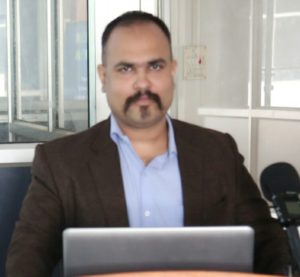 International Law as a subject has been introduced by Nagaland University at both the Undergraduate and Postgraduate Degree Courses of Political Science. It has been found that students are not aware about the importance and market-value of International Law. This article is a humble effort to introduce students to the value and importance of the study of International Law from various perspectives.
International Law as a subject has been introduced by Nagaland University at both the Undergraduate and Postgraduate Degree Courses of Political Science. It has been found that students are not aware about the importance and market-value of International Law. This article is a humble effort to introduce students to the value and importance of the study of International Law from various perspectives.
INTERNATIONAL LAW AS A SUBJECT OF STUDY AND GLOBAL RELEVANCE
When the word “LAW” rings in your ears, the first thing that comes to mind would probably be of crime, the criminals, the police, the advocates standing inside/outside court premises and the prison. However, law is more than just crime and punishment. It encompasses all aspects of your life, there is a law for almost everything,from issues related to education, business, economics, personal finances, marriage, health, the environment, politics, to issues related to human rights, international relations and many more. Right from your birth till your last breath you are under the absolute influence of Law. Law, as I believe, is the only thing which becomes your shadow the moment you are born into this world and remains with you throughout your journey till the ‘Grave’.
The 21st century has brought an era of “possibilities”. We are living in a strange time where every dream is likely to get the wings with the changing global scenario. Yes, we are living in a Global World where impossibilities have become possibilities, where local has become ‘GLOCAL’, where the world has become like a ‘Village’ where boundaries have almost disappeared. However, it is also true that in today’s increasingly globalised world, legal problems now span over countries and often involve regional and international treaties and laws which not only affect the international community at large but also common citizens like us; therefore, it has become essential that the students of Political Science comprehend how the global legal system works in the context of complex political realities of today’s world. Fortunately, Nagaland University has fully recognized the need for changing time and introduced “International Law” as a subject for 6th Semester Political Science Honours and Postgraduate M.A. (Political Science) program which we at Tetso College offer to our students.
At the outset it may be understood that International Law is the study and practice of the set of rules, agreements, and treaties that are binding between countries. International laws promote peace, justice, common interests, and trade. For example, the South China Sea and the Arctic Sea are hotly disputed areas where the Law of Sea comes into play to regulate who gets to access these bodies of water. Have you ever thought about the next frontier of space and space travel? Regulations and laws need to be in place for this unexplored and uncharted territory. Who knew space law is a real field of study? And what about the sea disputes and land border disputes that countries like China have been involved in, which too has contours of International Law.
The way International Law works is significantly different from the way any municipal law or domestic law for that matter works. International law doesn’t have a law-making body in the way India has Parliament. Nor does it have any real enforcement agency, like an international police force to enforce the law. In fact, there are certain schools of thought that question whether international law is law at all! However, International Law has been sourced from customs, traditions, generally recognized principles of law, treaties, U.N. Resolutions, Resolutions of International Organizations, Juristic writings, Judgments of International Tribunals etc. So, the mutually agreed “Contractual Relationship” and the ‘Principle of Free Consent and Acceptance’ is at the core of the functioning of International Law. The Municipal Law has a wide application around us.However, with international law, students get to see what they are studying applies on a global scale- often as front page news widely covered by the media; andthis, of course, is the USP of the subject of International Law which attracts large numbers of students all over the world.
Since I teach International Law to the 6th Semester Political Science Hons. students, I often invoke open-ended, free critical debates and discussions with them as to how International Law applies to current events — like Crimea, for example, or Syria — and considered topical, controversial questions such as whether Palestine is a state, what is the current status of Taiwan- Hong Kong, Tibet or ‘Azwad’- a region in the northern Mali, or what is the status of ‘Stateless person’, the practical legal aspects of Political Asylum, Refugee and Extradition, what is the meaning of ‘Freedom’ in today’s world of total global dependency or when can states use armed forces? For example, can states use force against other states in self-defence pre-emptively, that is, before they’re actually attacked? What happens when a region declares independence from its parent state? What responses to terrorism are permitted under international law, and when will a state be responsible for terrorist acts committed by its nationals? Whether U.N. is really an independent body of the nations? These are some debates that often spark in my class and in no time my classroom turns into a ‘Think Tank’.
I remember, once a student came to me and shared as to how studying International Law helped her to understand her position in the world in relation to her roots in her village in Nagaland. I did not ask what she meant by this, however, I was happy that the real purpose of academic study of a subject has been fulfilled.
Moreover, knowledge of International Law helps students to create a strong base for elite careers like International Journalism, Civil Services, International Litigation, International Civil Services, Research & Analysis, International NGOs, International Taxation, International Business Consultancy, International Commercial Arbitration and many more. Before joining the world of Research and Teaching, being a trained Lawyer with LLM Degree in International Law & Human Rights and M.A. in Political Science (with Specialization in International Relations and Conflict Studies) and also a PhD; I received some opportunities to participate as a team member in number of International projects, Litigations and Arbitration proceedings. Therefore, at least from my personal experiences I can vouch that the knowledge of International Law is a key to open the door of enigmatic possibilities and wonders of this world. However, your journey may start with International Law, but, where does it take you- depends on your inner calling for sure. Go wherever you can, my dear students, but remember, International Law will give the wings to you to fly, to rest and to fly again, riding over the winds of ‘experiences’. I want each of my students to see higher dreams and live an extraordinary, distinguished yet humble life in the service of humanity.
We must be really grateful to Nagaland University for accommodating International Law in the syllabus of Undergraduate as well as Post-Graduate Degree Courses of Political Science. It is a universally accepted fact that Political Science and Law are allied subjects that go hand in hand, thus, they are inseparable. International Law not only helps students to get themselves introduced directly to the world affairs but also make them realize their individual relationship with the international community- hence, it helps them to reach to the understanding that the common citizen of a country too is a stakeholder, and, has a voice in the International Affairs which seems too distant to have local impact.
Degree of Thought is a weekly community column initiated by Tetso College in partnership with The Morung Express. Degree of Thought will delve into the social, cultural, political and educational issues around us. The views expressed here do not reflect the opinion of the institution. Tetso College is a NAAC Accredited UGC recognised Commerce and Arts College. The editors are Dr Hewasa Lorin, Dr. Aniruddha Babar, Dr. Pfokrelo Kapesa, Rinsit B Sareo, Meren Lemtur and Kvulo Lorin.
For feedback or comments please email: dot@tetsocollege.org

